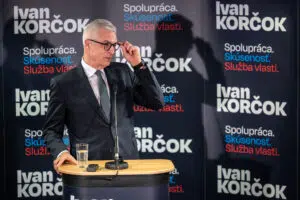Brussels – Less than twenty-four hours to the vote that could mark a turning point for Slovakia’s recent history. Tomorrow (April 6), Slovak voters will go to the polls to elect a new president of the republic, called upon to choose between the former foreign minister and candidate backed by the centre and liberal oppositions, Ivan Korčok, and the speaker of the national parliament and leader of the ruling HLAS-SD party, Peter Pellegrini. A vote whose outcome will significantly impact the executive of Robert Fico, who has been in office for six months, and which, for this very reason, can be considered the first popular test of the governing coalition between Social Democrats and the extreme right.

Korčok surprisingly received 42.51 per cent of votes in the first round on March 23, surpassing Pellegrini (37.02) by more than five percentage
points. To succeed the pro-European Zuzana Čaputová as president of the republic, the leader of the Social Democratic Party, who handed over power to Fico and the red-black coalition of pro-Russian tendencies, will be able to count on the support of the two coalition allies (the far-right Slovak National Party and the Social Democrats of SMER-SSD), while the former (2020-2022) foreign minister is betting instead on the mobilization of those who did not go to the polls in the first round (48.1 per cent of those eligible to vote, a figure in line with the last 20 years of elections in Slovakia). Another crucial factor will be the orientation of one in every five voters who did not express a preference for either Korčok or Pellegrini, given that on the eve of the vote, the head-to-head between the two candidates is still tight.

Although the presidential office in Slovakia is mainly ceremonial, the head of state can resort to reviews by the Constitutional Court in the case of controversial legislation. It is precisely this power that one must look to to understand the level of importance of the elections scheduled for tomorrow. If Pellegrini wins, Premier Fico will have carte blanche to push forward the legislative process on any policy (including those that have the potential to open contrasts with Brussels) criticized by liberal oppositions. Otherwise, Korčok has already said he is ready to cooperate with the government, but within the perimeter of his competencies if he deems it necessary, just as Čaputová has done in recent months. After the strongly criticised reform of the Criminal Code was approved by parliament, the president did sign the legislation, but by filing an appeal to the Constitutional Court, which suspended part of the law until the judges issued their ruling.
The Red-Black Slovakia
After the September 30, 2023 elections in Slovakia, the pro-Russian Social Democracy of SMER-SSD emerged as the leading force in parliament, followed by the Progressive Party of the former vice president of the EU Parliament, Michal Šimečka, and the Social Democrats of HLAS-SD. Pellegrini’s 27 deputies were instrumental in forming a majority with the two pro-Russian forces (the Social Democrats of SMER and the extreme right-wing Slovak National Party), although the party leader himself assured that “with our presence, we will ensure that Slovakia’s membership in the EU and NATO will not be jeopardized.”

From left: Slovakia’s Prime Minister, Robert Fico, and HlLAS-SD leader and presidential candidate, Peter Pellegrini (credits: Vladimir Simicek/Afp)
However, the decision to start a pro-Moscow government has also had consequences at the European level. On October 12, the presidency of the Party of European Socialism (PSE) decided to suspend the membership of Slovak parties SMER-SSD and HLAS-SD. The Group of the Progressive Alliance of Socialists and Democrats in the European Parliament opted to suspend the membership of the three Slovak MEPs due to concerns over policies on the merits of Russia’s war against Ukraine, migration, the rule of law, and the rights of the Lgbtq+ community. All this has been compounded in the last three months by a wave of protests due to the reform of the Criminal Code, which provides for the abbreviation of the statute of limitations for the most severe crimes (from 20 to 5 years) and the abolition of the office of the special prosecutor dealing with crimes such as those related to organized crime and high-level corruption. The opposition’s complaint is of an attempt to weaken the judiciary—in favour of Fico’s party members and high-level government supporters—in a country where the current prime minister himself had to resign in 2018 following the murder of journalist Ján Kuciak and his girlfriend Martina Kušnírová, who had exposed links between the ‘ndrangheta and the Slovak elite (including members of his SMER party).
This reform of the Penal Code could open a clash in Brussels similar to the one that occurred in Hungary, which led to the activation of the conditionality mechanism on the rule of law. At the time of the presentation of the draft, the EU Commission, the European Public Prosecutor’s Office (EPPO) and the EU Parliament had warned Bratislava on the fact that changes to the Penal Code could “seriously” compromise the level of protection of the EU’s financial interests in Slovakia, specifically in the area of corruption, fraud, and mismanagement of EU funds. In this scenario, countermeasures in Brussels would be inevitable. After it entered into force on March 15 (with some slight modifications to meet the objections of the three EU institutions), the Commission is expected to assess the reform as a whole and decide whether there are still concerns that warrant action ranging from infringement proceedings to activation of the rule of law conditionality mechanism.
English version by the Translation Service of Withub







